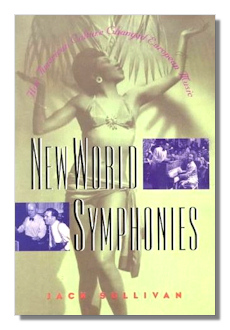
The Internet's Premier Classical Music Source
Related Links
-
Introduction
Acoustics
Ballet
Biographies
Chamber Music
Composers & Composition
Conducting
Criticism & Commentary
Discographies & CD Guides
Fiction
History
Humor
Illustrations & Photos
Instrumental
Lieder
Music Appreciation
Music Education
Music Industry
Music and the Mind
Opera
Orchestration
Reference Works
Scores
Thematic Indices
Theory & Analysis
Vocal Technique
Search Amazon
Recommended Links
Site News
 Book Review
Book Review
New World Symphonies

How American Culture Changed European Music
Jack Sullivan
Yale University Press
ISBN-10: 0300072317
ISBN-13: 978-0300072310
Summary for the Busy Executive: Flashy.
Jack Sullivan hooked me in as a fan with a terrific book on Alfred Hitchcock's use of music. As a writer, he has many virtues, not the least of which is a mind well stocked with a variety of facts, figures, and strains of thought. Believe it or not, one of the great pleasures of this book was to scan the index and lighting on one shiny name after another. It whetted my appetite for the argument that would tie all of these gems together.
Sullivan does indeed make an argument for something that has hung in the background of musical studies. Usually, a book on U.S. culture talks about how the country freed itself from European dominance to produce something unique and expressive. For once, that line of thought remains implied as Sullivan considers the converse: American culture influencing major European figures.
Sullivan starts in the 19th century. However, one can contend that American influence goes all the way back at least to Purcell and Dryden's Indian Queen, and the French went ga-ga over Chateaubriand's Indian romance Atala and the novella René, decades before Longfellow. At any rate, Sullivan breaks down the influences and associates them with composers in the following way:
- Black spirituals: Delius, Dvořák, Coleridge-Taylor, Korngold, Zemlinsky, Grosz, Tippett
- Longfellow's Hiawatha: Dvořák, Coleridge-Taylor, Delius
- Poe: Debussy, Ravel, Rachmaninoff, Messiaen, Ruders
- Whitman: Delius, Vaughan Williams, Holst, Hindemith, Weill, Starer
- American landscape: Puccini, Bloch, Delius, Varèse, Milhaud, Messiaen
- Broadway & Hollywood: Korngold, Weill, Steiner, Waxman, Rózsa, Tiomkin, Britten
- Jazz: Krenek, Debussy, Ravel, Milhaud, Stravinsky, Hindemith, Schulhoff, Weill, Lambert, Britten, Arnold, Tippett, Wolpe, Bennett
Sullivan devotes good space to those composers and mentions others in passing. The names alone fascinate, although by themselves they wouldn't contribute to the book's success. Fortunately, Sullivan makes effective use of them in this construction of intellectual history. I don't want to deprive anybody of the pleasure of taking the ride with Sullivan, a vivacious mind expressing itself in zingy prose. In fact, it may be a little too breezy. Like the book on Hitchcock, small errors plague this book. For example, Victor Herbert did not provide the score for D. W. Griffith's Birth of a Nation. Miklós Rózsa, not Dimitri Tiomkin, wrote the music for Spellbound – a particularly embarrassing mistake from the author of a Hitchcock study. Does Yale University Press not employ editors any longer?
Ultimately, however, no lapse is large enough to sink the book. Sullivan has heard a heap of music, some of it quite off the beaten path, and has constructed a compelling narrative on the flow of ideas and the power of symbols. The music itself has less importance than the conceptions behind the music or engendered by it, and so Sullivan can legitimately avoid technical analysis and musical type to appeal to the general reader. The endnotes and the index are good, but I miss a bibliography. I really want to know what Sullivan's read so I can read it, too. I could always untangle the endnotes, but a bibliography would save me the effort.
An original and entertaining study.
Copyright © 2012 by Steve Schwartz.



















